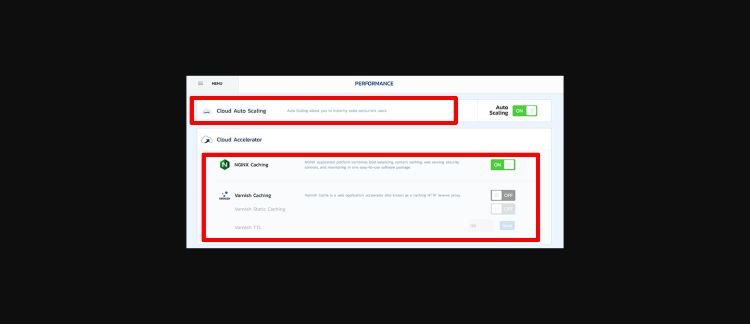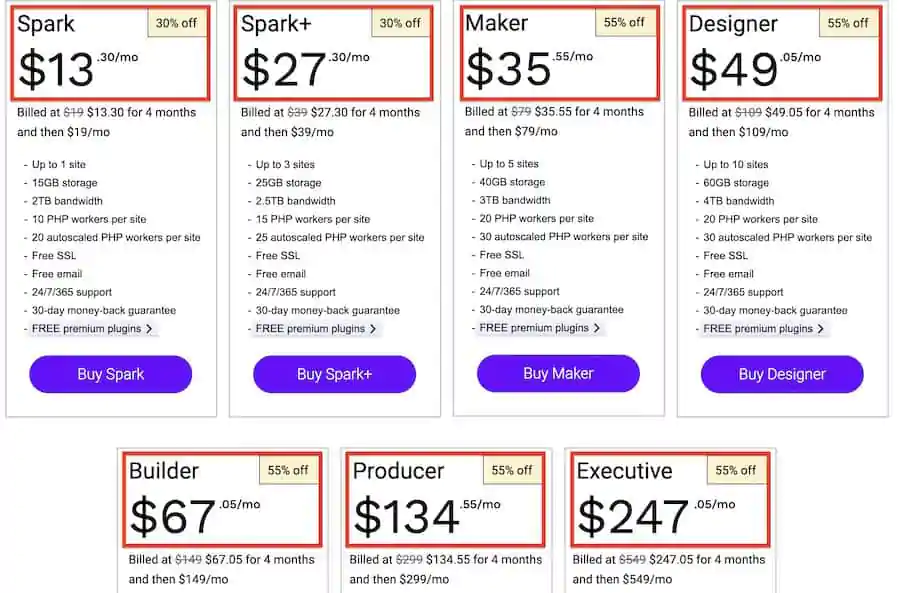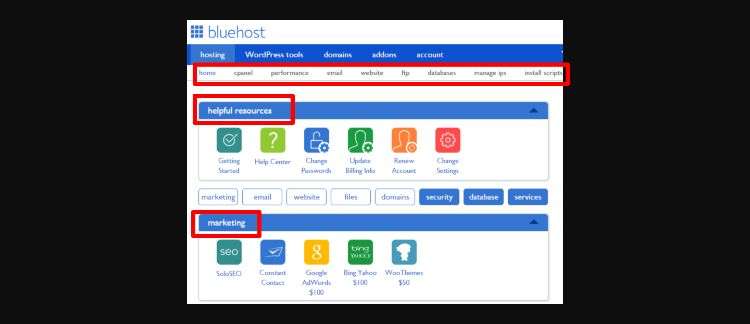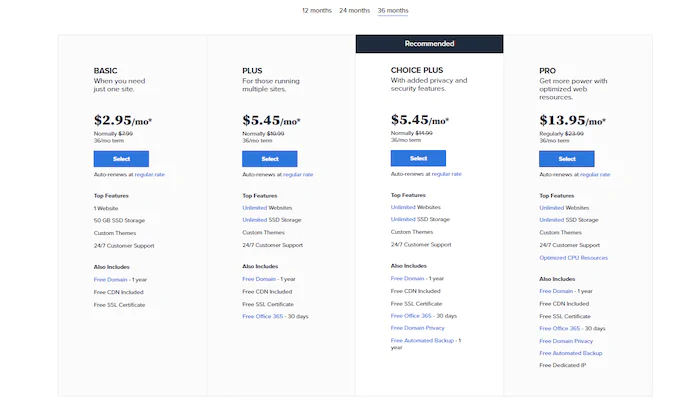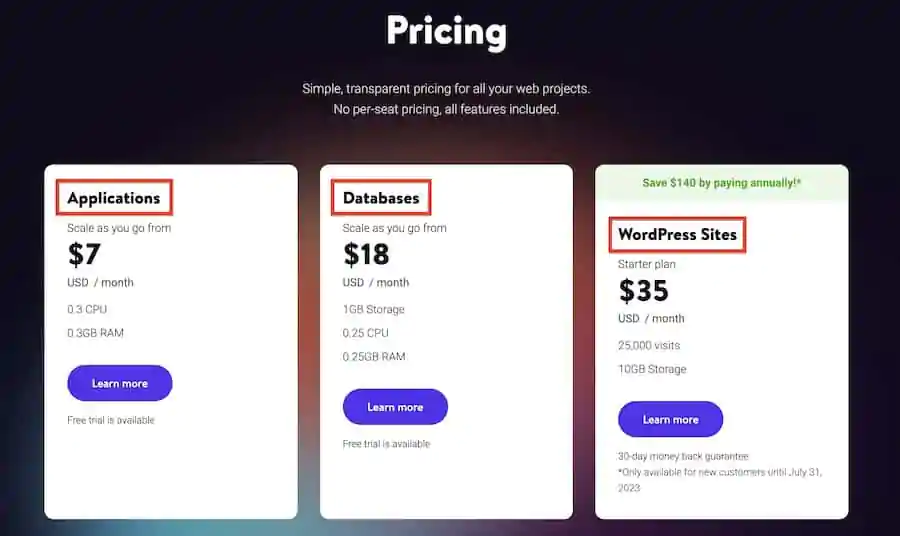Let's discuss accounting software for businesses; as you already know, if you
21+ Best Web Hosting Services of 2025 (Top Providers Ranked)
As we discuss the best web hosting services of 2025, here are my top three (3) choices below:

Hostinger
Overall Rating: 4.75
Hostinger has grown to become the go-to web hosting service for most startups. They have web hosting plans for everyone including WordPress Hosting, Cloud Hosting, VPS Hosting, etc.
Their pricing is also very affordable when compared to other hosting services out there; check out the huge discount below:
WP Engine
Overall Rating: 4.78
When it comes to WordPress Hosting, this web hosting service is leading; so if you want to build a solid WordPress website that will stand huge traffic and also benefit from premium WordPress tools, this hosting is for you.
Click on the button below to try wp-engine for yourself today. We have tested it and it's worth it.
Bluehost
Overall Rating: 4.75
It would be a sin not to mention bluehost becasue these guys are seen as the grandfather of WordPress hosting. You can't go wrong with Bluehost as long as you are building a WordPress website.
Their pricing is also very affordable when compared to other hosting services out there; check out the automated discount by clicking the button below:
What Are The Best Web Hosting Services?
If you use our links to purchase something, we earn a commission.

David's Take
Amongst many other qualification that Nexcess has, it is my first pick because of it's strength in carrying heavy website. They are little pricey but worth it when it comes to building a website that can carry a lot of traffic. You'll understand what I mean when your site starts growing.
| Best For | Overall Web Hosting |
| Price | $13.30/mo - $699.30/mo |
| Annual Discount | Yes – 2 Months Free |
| Promotion |
Key Features:

- Advanced caching.
- Daily backups.
- Image lazy loading.
- Unlimited email accounts.
- WordPress core updates and WordPress plugin updates.
- One-click staging site (clone of your live website).
- A built-in CDN with 22 locations.
- Unlimited traffic.
- Always-on security monitoring.
- 24/7/365 customer support.
Visual Regression testing also ensures system updates do not interfere with your code structure or features.
The hosting plans also come powered with plugins like iThemes Security Pro, WP Merge, Visual Compare, iThemes Security Pro, TinyPNG, and Qubely Pro.
User Experience:
Cloud auto-scaling features allow the site to adjust server resources on the fly according to traffic spikes, which is great for larger businesses that experience significant traffic fluctuations.
In addition, various cloud acceleration features mean that the site will load quickly regardless of where the visitor is.
Pricing:
Nexcess offers seven pricing plans:
- Spark – $13.30 per month
- Spark + – $27 per month
- Maker – $35 per month
- Designer – $49 per month
- Builder – $67.05 per month
- Producer – $134.55 per month
- Executive – $247.05 per month
What I Like/Dislike About Nexcess:
Like:
- Good dashboard to keep track of server resources and usage.
- Uptime means the site will rarely go down, and speed is essential for keeping visitors engaged.
- Quick, comprehensive support helps you troubleshoot any problems that do come up.
Dislike:
- NGINX for our dedicated servers would be nice to see.
Product Updates:
- Mobile Experience Improvements so people can better use your site on the go.
- Support Ticket Enhancements allow users to get even better support when they need it.
Follow this link to get 50% off the pricing plans for the first six months.

David's Take
Bluehost is my top pick for those who want a tailored solution to their business needs. Whether you run a website, blog, or online store, you will find what you need at Bluehost.
| Best For | Tailored Plans |
| Price | $2.95/mo - $13.95/mo |
| Annual Discount | No |
| Promotion | Get Started For $2.95 |
Bluehost is my #1 hosting platform recommendation, with a free domain, free SSL included, 1-click WordPress install, FTP, and 24/7 customer support.
Their plans start at $2.95/month (63% off) and have a 30-day money-back guarantee.
They are an all-encompassing platform tailor-made for WordPress and powering over 2 million websites.
Their easy-to-use interface allows you to sign in, choose your domain, install WordPress with one click, choose your themes, and create your site.
They launched in 1996, and they now have a staff of over 750 employees. They have a 99.99% uptime, making them a very reliable option.
With average load times under half a second, site speed won’t be an issue.
With my WordPress site and their cheapest plan, I leveraged a few easy plugins and got my desktop site speed to 100.
One of the most significant selling points for me was their security and integration with Cloudflare – a content delivery network (CDN). This CDN prevents DDoS attacks and fake traffic from various sources.
Using a CDN also increases site speed by allowing you to host your web files on their worldwide network of servers. This service shortens the time it takes to fetch data from your server based on a visitor’s location.
If you’re reading other web hosting comparisons and looking for extra features, Bluehost integrates with different software in their MOJO Marketplace. For example, installing software is easy if a customer needs shopping cart software or e-commerce functionality.
Finally, they are the “official” WordPress.org recommended web hosting platform, and you can read my full review here.
Key Features:
- cPanel Account Control Panel makes it easy to manage your hosting account,
- Forwarding E-mail Accounts allows you to set up custom email addresses using your domain name.
- Support International Domain Names allows you to use your domain name with multiple internationalized domains.
- Unlimited Domain Hosting means you can host as many websites as needed on your account.
- Unlimited Disk Storage gives you plenty of space to grow your website.
User Experience:
Providing a visual drag-and-drop editor for those who want to create their website without having to learn to code, Bluehost makes website creation easy.
The interface is easy to understand and relatively intuitive, so it’s easy to get started whether you are a beginner or have some experience.
Pricing:
Bluehost pricing starts from $2.95 per month.
What I Like/Dislike About Bluehost:
Like:
- Free domains are a great way to get started with a new website
- Customer support is always available to help you troubleshoot any problems.
- The Bluehost Builder makes it easy to create a professional-looking website without learning to code.
Dislike:
- Renewal charges are a bit high.
- Website Migration Fees can be expensive if you move your site to another host.
Product Updates:
- Integration with various WordPress updates so you can keep your site up-to-date.
Here’s how to get started:
- Go to Bluehost.com and click Get Started
- Choose the plan you want ($2.95/month is the cheapest)
- Either enter a new name or select one you own
- Enter your account information, account plan, and billing information
- I would uncheck the add-ons Sitelock Security and Codeguard Basic
- Click Submit, and you’re ready to go!
I recommend you get started with their Basic Plan for $2.95/month, which is 63% off their regular price.
How to Save the Most:
- Plan: Basic Plan at $2.95/month
- Term: 36 months
- Total cost at checkout: $106.20
- Savings: $181.44
David's Take
WP Engine is a great hosting solution for any business looking to get more out of their WordPress site. With added protection options custom-built for WordPress environments, WP Engine guarantees your WordPress sites stay secure and running at their best.
They also offer the possibility of effortless scalability on demand across cloud platforms.
| Best For | Enterprise Hosting |
| Price | $20/mo-$600/mo |
| Annual Discount | Yes – 4 months free |
| Promotion | 60 Day Guarantee |
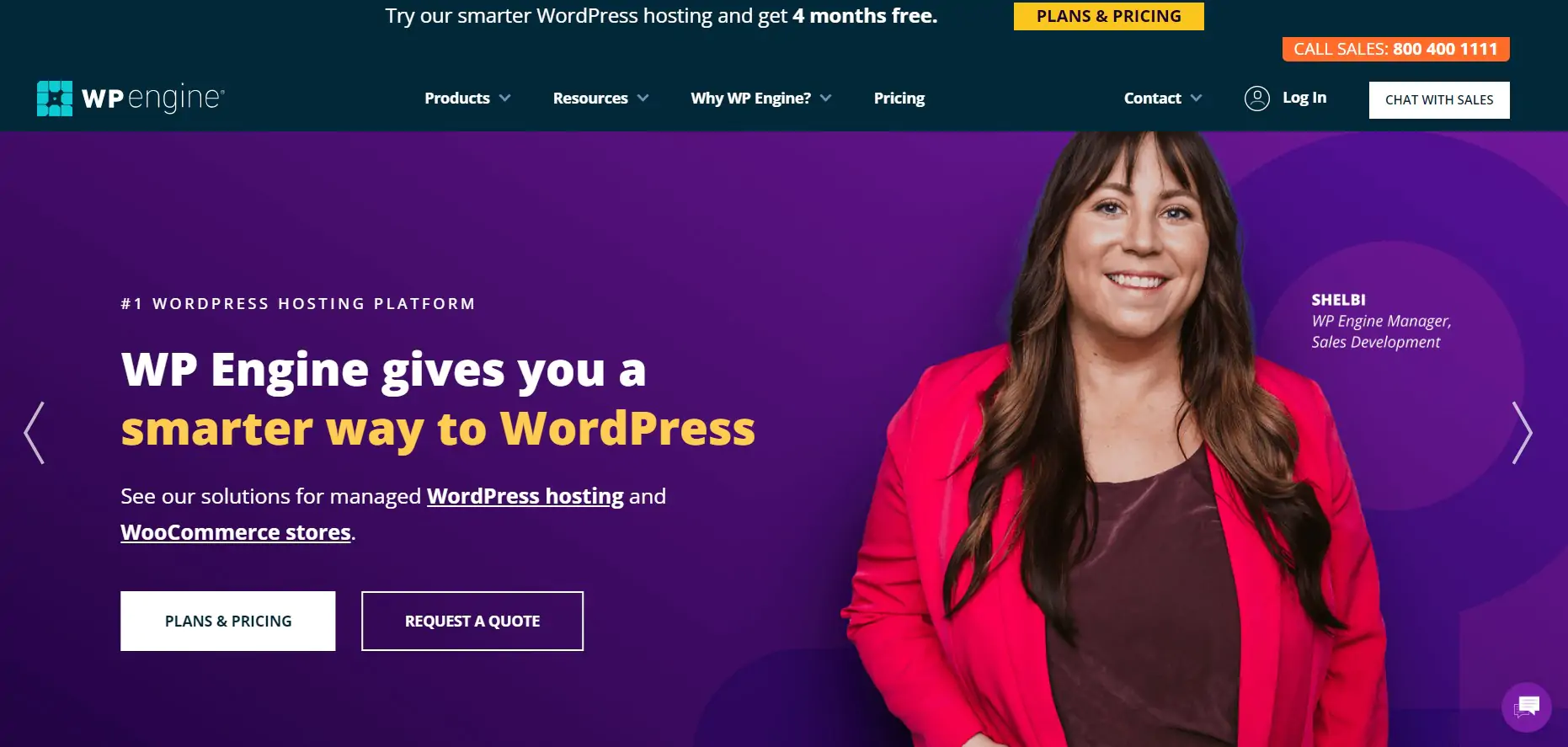
WP Engine is a managed hosting company based in my town of Austin, TX.
They primarily focus on speed, security, and scalability.
Their Managed hosting is specifically built for WordPress sites and comes at a higher price.
It’s not precisely hosting but dedicated services to keep your WordPress site live.
Site speed is where WP Engine excels.
While other providers may include customized servers, you can still get bogged down by installing many WordPress plugins.
But with WP Engine, they have a network of servers with more aggressive caching than other providers.
Key Features:
- Advanced Custom Fields help you create a rich content editing experience for your users.
- WP Migrate makes it easy to migrate WordPress sites with a few clicks.
- WP Offload Media helps you offload media assets from your site and serve them up lightning-fast from different locations worldwide.
- WP Offload SES lets you send emails through Amazon’s Simple Email Service (SES) for improved deliverability.
- Reliable customer service and high-end custom plans for the enterprise.
Their basic plan (Managed WordPress) starts at $23/month.
They also offer specific plans for eCommerce along with more advanced solutions.
Each program comes with proactive threat-blocking automated WordPress updates and customizable workflow tools.
David's Take
Cloudways offer high performance and reliability at an affordable price. Their platform is easy to use, and they provide excellent customer support.
With simplicity and flexibility, you’ll still be able to get the performance and features you need without having to overspend.
| Best For | Managed Cloud Hosting |
| Price | $12/mo - $96/mo |
| Annual Discount | No |
| Promotion | 3-Day Trial |

As its name suggests, Cloudways uses a scalable platform built for speed and simplicity.
Unlike shared web hosting, cloud servers give you more dedicated resources, which can help with speed and stability.
It’s a robust hosting service for web developers, as it allows PHP developers to deploy containerized applications and other advanced features.
Besides supporting PHP7, Cloudways supports many other high-performance technologies like HTTP/2, Nginx, and Redis.
All Cloudways customers can add cloud servers to their accounts at any time.
You can also set up a virtual cloud server in under a minute.
WordPress is the most popular content management system (CMS) used with Cloudways (not surprising), followed by Drupal and Magento.
And if you’re looking for security, they provide SSL certificates with domain mapping.
If you’re an experienced developer and want more control over your website, Cloudways is a good option.
Key Features:
- Server Monitoring Dashboard ensures your site’s availability by keeping a watch on the performance of all your servers.
- CloudwaysCDN Integration speeds up your website’s loading time by caching its content on a Content Delivery Network.
- Application Monitoring Dashboard gives you detailed insights into the performance of your applications.
- IP Whitelist allows you to whitelist IP addresses for increased security.
- SSD-based hosting gives you increased website and application speed.
User Experience:

From creating new members and ensuring the correct permissions are in place to monitoring the performance of your servers and applications, Server Management Dashboard is easy to use and provides a great user experience.
Pricing:

Pricing is tiered based on the server specs you choose and the cloud provider. It starts as low as $9.80/month, and there is a free 3-day trial.
It seems like a short trial, but it gives you enough time to dive into the platform and test its functionality.
What I Like/Dislike About Cloudways:
Like:
- You get out-of-the-box usability with Cloudways. You don’t need to set up or configure anything, create an account, select your application and server, and you’re ready to go.
- The performance is also excellent, so site visitors don’t have to wait long for pages to load.
Dislike:
- You can’t easily host DNS for free there, so you’ll have to use a third-party service if needed.
Product Updates:
- Safe Updates feature for WordPress is now in General Availability. If something goes wrong when you update a plugin, theme, or WordPress, you can quickly and easily roll back to a working version.
David's Take
While Hostinger is excellent for those that want web hosting on a budget, the service is still top quality. You get free features such as SSL and migration, a speed boost for PHP, and even 24/7 tech support.
If you’re looking to start a website without spending a fortune, I recommend you check out Hostinger.
| Best For | Affordable Hosting |
| Price | $1.99/mo - $4.99/mo |
| Annual Discount | No |
| Promotion | Get Started For $1.99 |

Hostinger is a great hosting company because of its speed and price.
Using Hostinger allows developers to learn to code and experiment with PHP, FTP, cPanel, and MySQL without the added cost.
Using free hosting sites and learning PHP, you can learn to build free WordPress sites and hone your skills simultaneously.
They have a super knowledgeable 24/7 multilingual (20+ language) Customer Success Team and are known to pick up a live chat in less than two minutes.
They are also one of the fastest web hosting providers, with an average page load speed under 200 ms and guaranteed uptime of 99.9%.
Hostinger has a custom, easy-to-use dashboard.
The design is clean and straightforward, which is what you need when building a site.
Additionally, they are running a massive sale offering free SSL certificates and domains.
Hostinger provides a free WordPress site with a 1-click installation so you can start your blog free of charge in minutes. They also have their Zyro website builder with thousands of templates.
Key Features:
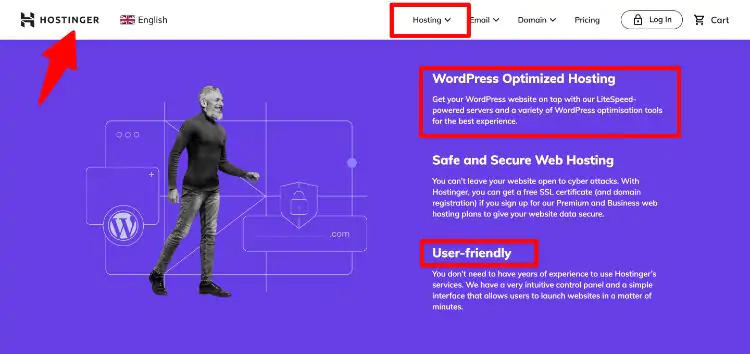
User Experience:
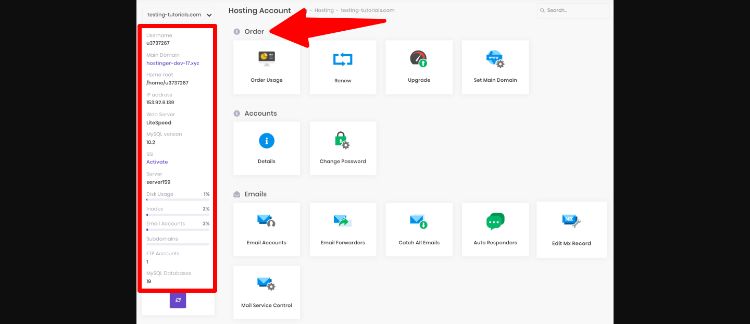
With a left-hand side menu that gives you all the needed information to get started, Hostinger’s interface is clean and easy to understand.
All the product options are categorized into separate tabs, so you can easily find what you’re looking for.
The steps to get up and running with their services are easy:
- Go to hostinger.com and click get started.
- Choose your hosting plan – the best savings are with the $0.99/month plan for 48 months.
- Enter your email and create a password.
- Choose either WordPress or build your site.
- Edit and publish your site.
If you want a mighty host on a budget with one of the fastest loading times and an incredible 90% discount, I recommend you get started with Hostinger for $0.99/month ($47.52 for four full years of hosting).
What I Like/Dislike About Hostinger:
Like:
- Multiple FTP accounts mean you can give different people access to other areas of your site, which is great for larger businesses.
- The user interface is clean and easy to understand, so you can get started quickly.
- You can choose the server of the desired country, which is helpful if you want your site to load quickly for visitors in that area.
- Affordable rates mean you can get started with Hostinger without breaking the bank.
Dislike:
- Their support system is a bit lacking and could be improved.
Pricing Plans:
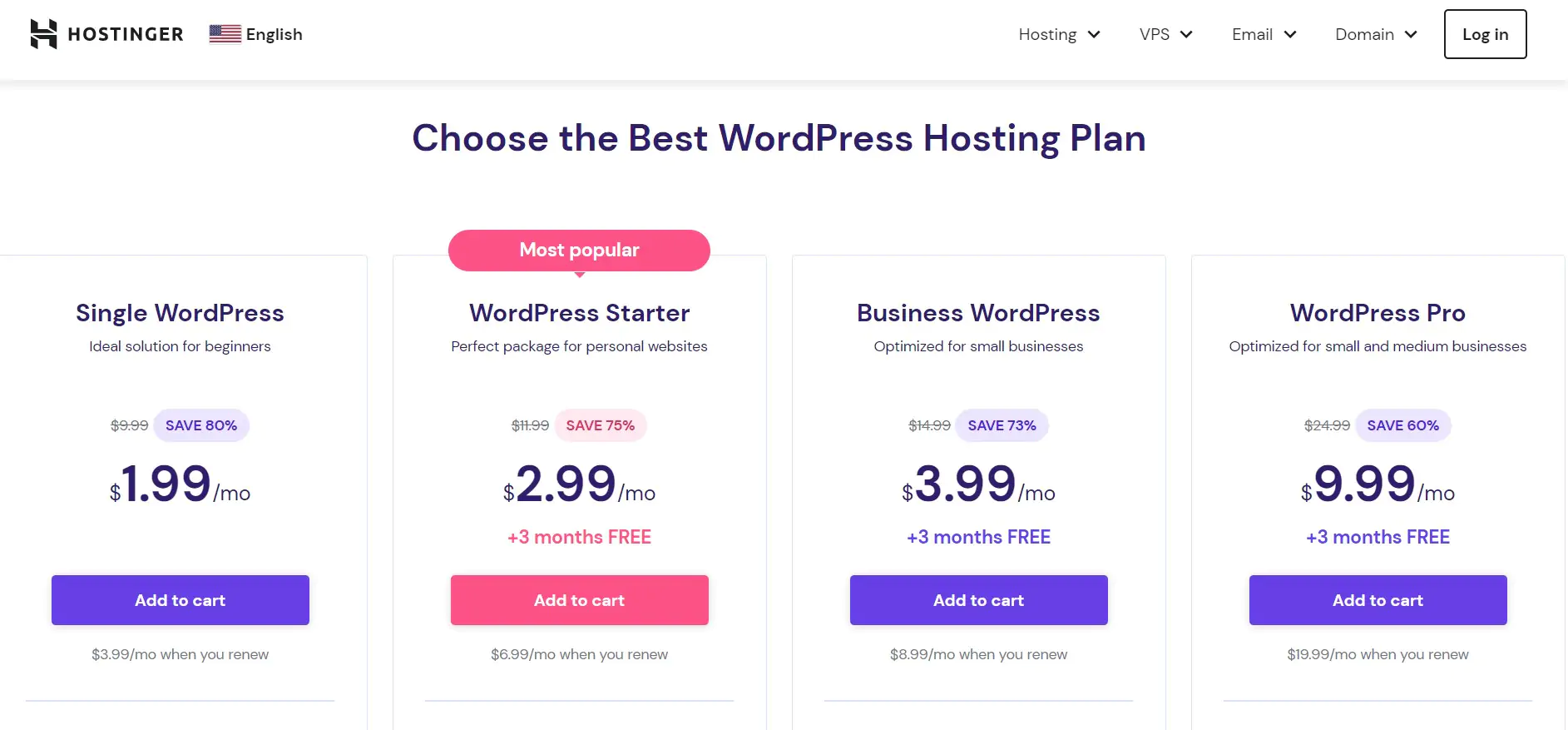
Product Updates:
Focus on fast loading speed means your site will load quickly regardless of where visitors are.

David's Take
I recommend HostGator if you’re looking for a proven web host with a guaranteed uptime of 99.9%, ensuring that your website is up and running when anyone tries to access it. I also like HostGator because they offer easy WordPress installation, free SSL certificates, and a free domain for the first year.
| Best For | 99.9% Uptime |
| Price | $2.75/mo - $5.25/mo |
| Annual Discount | No |
| Promotion | Get 65% Off |
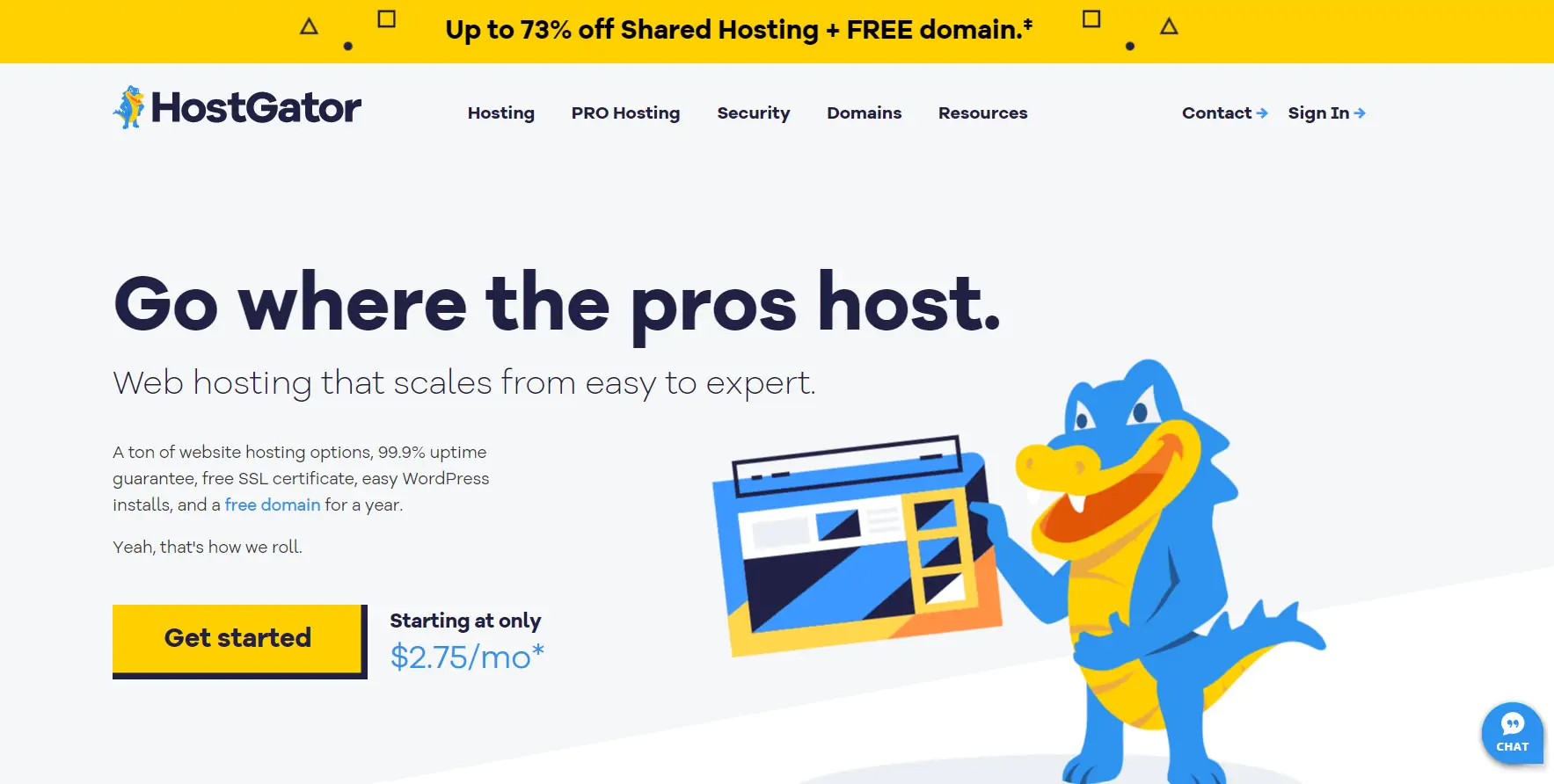
HostGator is a well-known hosting provider based in Houston and hosts over 9 million websites.
They are one of the cheapest options, with plans starting at $2.78/month on 36-month plans and savings from 30-60%.
To dive deeper, you can read my complete HostGator review.
As you can see below, they stack up well against GoDaddy and website builders like Squarespace in both price and feature set:
Their average speed is barely under one second, so they aren’t the fastest option, but they are better than average.
They also hit a 99.98% uptime, which is better than the industry average of 99.94%.
They make the website building process easy, with simple drag-and-drop functionality and the ability to add unlimited domains to your account.
They’ll also assist with free migrations within the first 30 days of your sign-up.
HostGator offers 24/7 customer support through live chat, email, and phone, and they have pretty good response times.
Key Features:
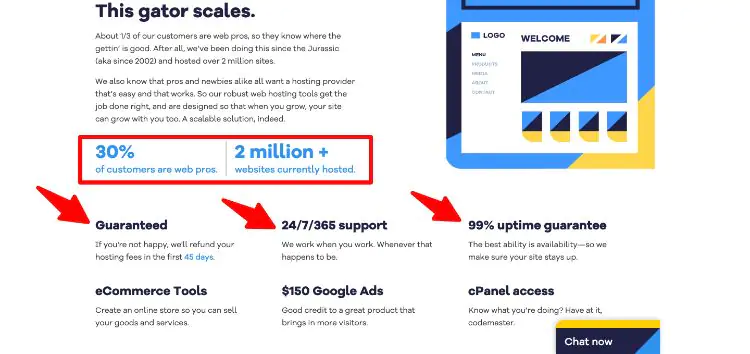
User Experience:
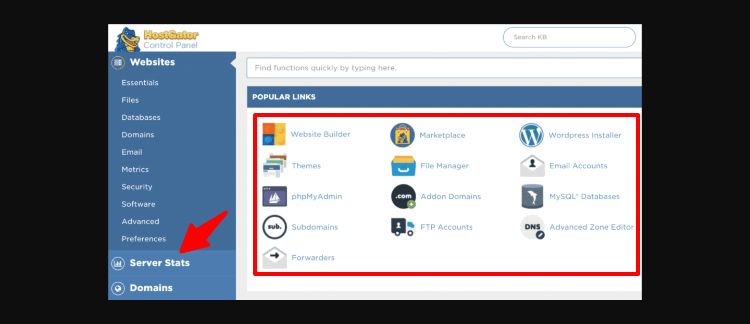
Pricing:

They offer three main plans, including Hatchling, Baby, and Business. The higher-tier plans include dedicated IP addresses and SEO tools to grow your online presence.
They have a 45-day money-back guarantee if you’re unsatisfied with your purchase.
Here’s how to get started:
- Go to HostGator.com and click Get Started.
- Choose a domain (or add one you own).
- Pick your billing cycle. Select the $2.78/month plan for 36 months for the most savings.
- Enter your billing info.
- Click Checkout, and you’re all set!
You can try the Hatchling plan and get started for $2.78/month?
What I Like/Dislike About HostGator:
Like:
- Lots of tools and interfaces make it easy to find what you need.
- An affordable solution that can save you money in the long run.
- The interface is easy to understand and use.
Dislike:
- Sending emails in bulk can be a bit tricky and time-consuming.
How to Save:
- Plan: Hatchling at $2.78/month
- Term: 36 months
- Total cost at checkout: $100.08
- Savings: $150.12
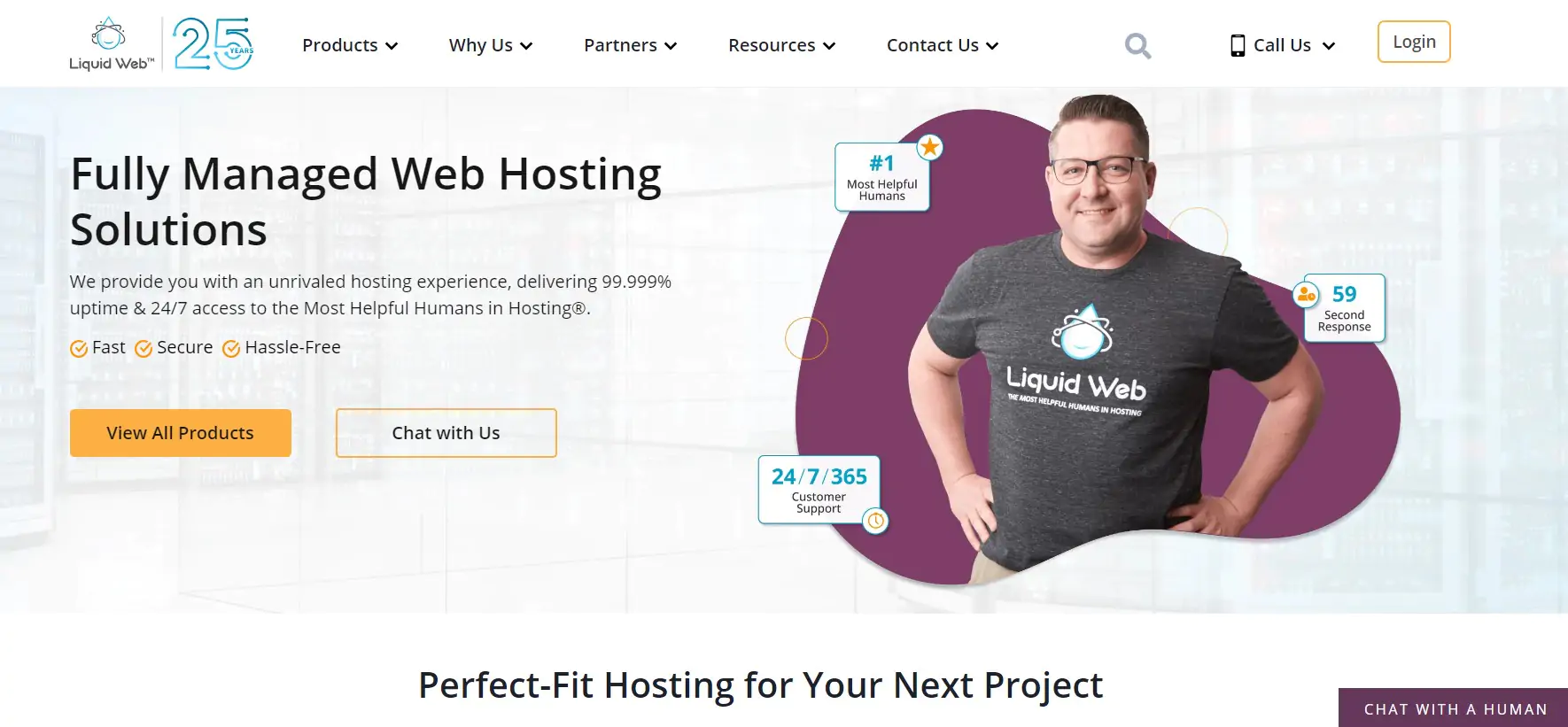
Liquid Web provides “all the managed hosting you’ll ever need.”
They are known primarily for their fully managed hosting services.
If you want to work with the “most helpful humans in hosting” and never worry about updating a plugin again, read on.
First, their 24/7 customer support has an unbeatable 59-second guarantee.
I tested it three times, and it held up to the test. The first time I called in, I received an actual live human in 44 seconds.
The second time was 32 seconds. Finally, the third time was 48 seconds – cutting it close.
If you’re looking for a variety of different hosting options, Liquid Web has 6+ other hosting options depending on your needs:
If you’re starting a new site, their Managed WordPress hosting starts at $19.33/month. With that plan, you get one website, 20 GB SSD storage, 5 TB of bandwidth, a free staging environment, and backups every 30 days.
If you’re a small or medium-sized business that needs a fully-managed cloud or VPS hosting platform, Liquid Web excels.
Here’s How to Save:
- Plan: Managed WordPress Hosting – Personal (Annual) at $19.33/month
- Term: 12 months
- Total cost at checkout: $232.00
- Savings: $116.00
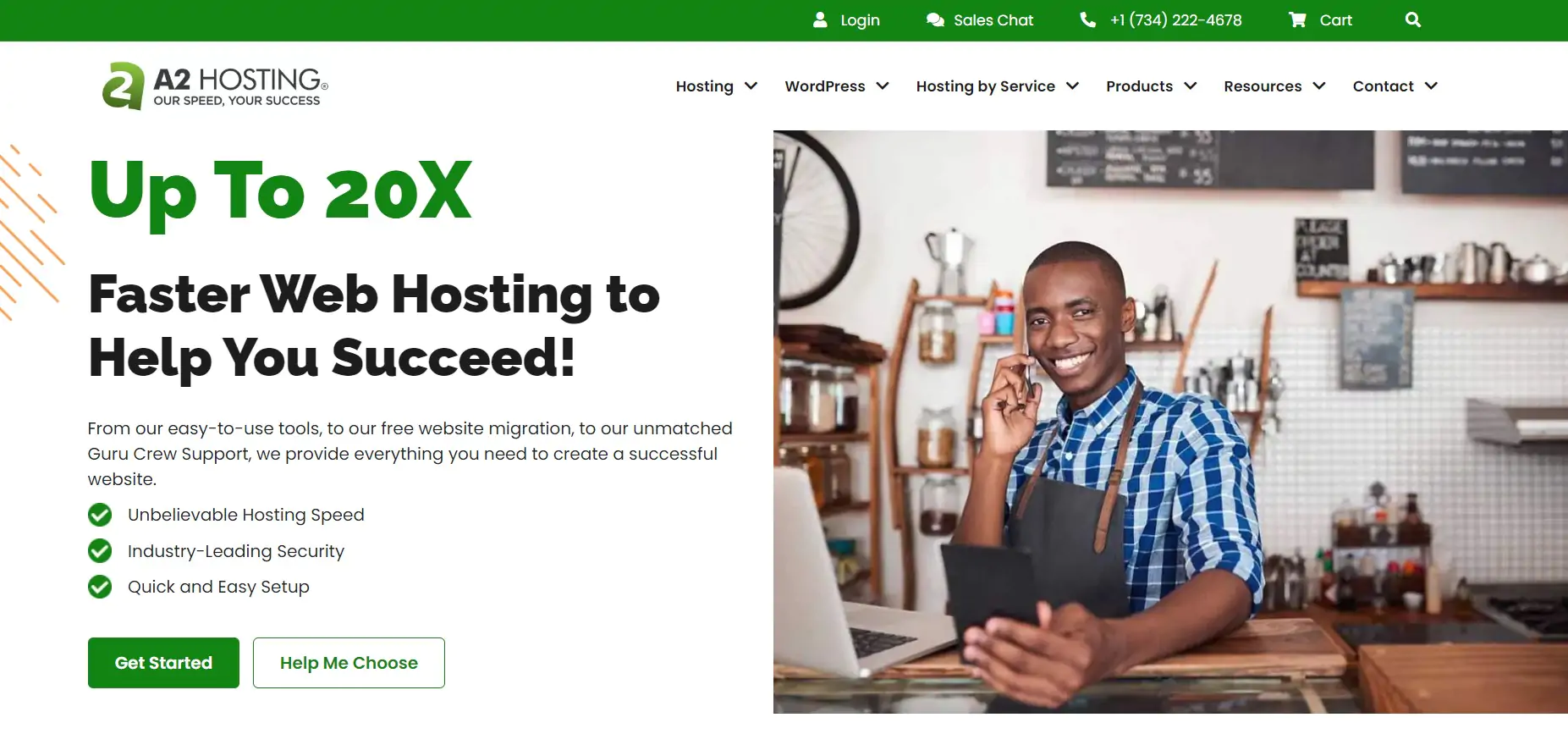
A2 Hosting was launched in 2001 in Ann Arbor, MI. They are known as one of the fastest web hosts.
Using turbo servers to give users a free 20x page load time helps with speed – a major Google ranking factor. Site speed can affect not just rankings but bounce rate, time on page, and conversion rates.
I’d say that site speed is one of the most critical aspects when choosing the best web hosting.
Like many other hosts, you can 1-click install WordPress, Joomla, Drupal, and other content management systems (CMS).
They also offer free migration services, SSD, SSH, PHP 7, and global servers to store your files and distribute them quickly to web visitors worldwide.
A2 Hosting works for both Linux and Windows and offers a wide range of SSL certificates, including Let’s Encrypt, Single-Site, Wildcard, Premium SSL, and Advanced SSL.
You can get started with A2 Hosting for just $3.92 per month (51% off) at the link below instead of their typical $7.99 per month.
How to Save:
- Plan: Lite Web Hosting at $3.92/month
- Term: 36 months (3 years)
- Total cost at checkout: $140.94
- Savings: $146.70

Inmotion Hosting is a hosting platform you can trust, with an A+ rating from the Better Business Bureau, and is 15-year CNET-certified.
They offer shared, dedicated resellers, virtual private servers (VPS), cPanel, WordPress hosting and integrations, and several free tools that help you sell online.
They are fast and reliable with secure servers, hacking protections, custom firewalls, and DDoS protection.
Their shared plans start at $4.99/month with a 37% discount.
With this WordPress plan, you receive up to 20,000 monthly visitors, 40GB of solid-state storage, one website, and unlimited emails.
They are best known for their managed security, updates, and speed optimization. Security management includes hack and malware protection and automatic backups.
Speed optimization includes 10x faster speed than average shared plans, free SSD storage on the Cloud Linux platform with NGINX, and PHP 7.
Overall, Inmotion Hosting is a good choice if you’re looking for WordPress site speed without the high price tag. They also have a hassle-free 90-day money-back guarantee.
How to Save the Most:
- Plan: WordPress Hosting WP-1000S at $4.99/mo
- Term: 36 months
- Total cost at checkout:$179.64
- Savings: $108

WebHostingPad is a full-service web hosting provider that provides 99.9% uptime, 1-click WordPress installs, a website builder, and free SSL certificates. You also get a free domain name for the first year.
Their web hosting plans use a scalable structure so that you can scale up as your website grows.
WebHostingPad also has several ecommerce-ready storefronts so that you can start selling online. They also have free analytics tools so that you can track your website visitors and their behavior on your site.
Their Power Plan is the most popular at $1.99/month and provides the following:
- Free domain name
- Free SSL certificate
- Unlimited hosting storage
- Unlimited bandwidth
- Unlimited email accounts
If you run a WordPress site, you should opt for their Power Plan + WordPress Pro plan, which adds 2x computing power, automatic malware scans and removals, and automatic account backups.
Overall, WebHostingPad is a cheap web hosting company that offers everything you need.
You can get started with WebHostingPad for $1.99/month, 60% off their regular price of $4.49/month.

Best Premium WordPress Hosting with Migration Support: ($25/mo)
Kinsta launched in 2013 with the single goal of creating the best WordPress platform in the world.
Their primary focus is working with WordPress experts to create hosting with speed, security, and stability that sets the industry standard.
They have a powerful and easy-to-use dashboard where you can view multiple sites at once, analytics reports, manage users, and see your resource usage.
Kinsta’s Starter Plan is $30 per month ($25 if paid annually) and comes with 1 WordPress install, 20,000 site visits, free SSL and CDN, and 5 GB of disk space.
If you are a more substantial business and need to scale your hosting as you grow, they have a tier of 10 different plans.
These increase your number of websites, SSD storage, and monthly visitors.
All plans come with unlimited free migrations from several hosts, automatic daily backups, manual backup points, 24/7 support, and their white-labeled cache plugin.
Once you select their $60 per month Pro Plan, you get extra hosting features, including their free “White Glove Migrations.”
These features allow you to fill out a form, and their team of engineers will set up your site for you.
If you’re serious about your WordPress speed and security, Kinsta is a strong pick.
If you’re an agency developer that wants to host multiple client sites and scale as you grow, Kinsta is a great option.
Here’s How to Save:
- Plan: Starter (Annual) at $25/month
- Term: 12 months
- Total cost at checkout: $300
- Savings: $60

Namecheap is a company founded in 2000 that manages over 10 million domains.
They offer many different options, with domain registration and other hosting alternatives like shared, reseller, dedicated, VPS, and WordPress hosting starting at $2.88/month.
They have a new service called EasyWP, which makes it super fast to set up a WordPress site, with prices starting at $3.88 per month.
I tested it myself and had a website set up in under two minutes.
Their main packages offer free backups, website migration, 24/7 support, and a 14-day money-back guarantee.
Their shared hosting plan is slightly more expensive than other cheap options on the list, but with the link below, you can get 50% off for your first year and get started for $15.44 per year.
Founded in 2000, Domain.com is one of the top players in the domain registration and hosting space that specializes in affordable websites, hosting, email, SSL certificates, web design, and online marketing services.
Domain.com offers its WP Starter plan starting at $3.75 per month, which provides a custom control panel, unlimited storage, unlimited bandwidth, free pre-installed themes and plugins, and a .blog domain.
This plan comes pre-installed with the W3 Total Cache plugin, which is an excelling caching plugin for site speed.
But it also comes with Jetpack, which has many comprehensive features for WordPress, but I remove it because of its site speed issues.
If you get started with the WP Starter plan, I recommend you remove Jetpack and find faster plugins that can provide the same functionality.
Domain.com is an all-encompassing website solution and the right choice for beginners without much website experience.
I recommend their WP Essential plan, which adds dedicated WordPress support and starts at a promotional offer of $6.95 per month with my link below.
What is Web Hosting?
Web hosting is a service that allows websites to serve resources on the internet with the ability to be accessible anywhere on the World Wide Web.
These companies buy or lease servers in data centers connected to the Internet and sell space on these servers. A web server in a data center can contain one or more websites.
The operating system settings are different if you have shared, dedicated, or VPS hosting.
Websites are just a bunch of files – HTML files, CSS files, images, photos, etc. All data live in a folder on a computer connected to the Internet.
That computer is a “server” because it serves up files when people come to visit.
When Internet users want to view a website, all they do is type in the web address into their browser.
Their computer then connects to the server, and webpages (files) are delivered through the browser.
To build a website, you need a domain and a hosting account. If you don’t have a domain, you can purchase one as an add-on.
You can use separate domain registrars and web hosting companies.
However, you’d have to point your domain to your web host by editing the DNS records.
You will not have to change your domain settings if you purchase the domain name and website hosting from the same company.
But, for example, if you already have a website with GoDaddy and want to host with another provider, you’ll have to change your DNS records.
Here are some other things to keep in mind when choosing a provider:
- Know your hosting needs.
- Look into server reliability and uptime guarantees.
- Investigate hosting upgrade options if scalability is essential.
- Look into signup and renewal, as they may be very different.
- Research control panel for ease of use.
- Ensure the hosting platform has essential features: a one-click installer, FTP and STFP Access, .htaccess files, disk space, and data transfer capacity.
- Research site’s speed, page loads times, and if they integrate with a Content Delivery Network (CDN)
What Are the Different Types of Web Hosting?
1. Cloud Hosting.
Cloud hosting is a new type of hosting that uses a virtual server network that stores your files in the cloud rather than on one server.
This type of hosting is great for security and mitigating DDoS attacks, as multiple servers and entry points are much harder to hack than a single server.
Cloud hosting plans are pay-as-you-go – since they’re virtual, they aren’t taking up resources when they’re not in use.
Another benefit to this pay-as-you-go model is that you can easily upgrade your services over a specific time if you expect a boost in traffic.
One advantage of cloud hosting is adding more virtual server resources to your website as your traffic grows.
This flexibility allows you to increase bandwidth as your online business scales incrementally.
For example, if you use shared hosting and your server goes down, your website is out of luck.
However, your site won’t go down with cloud hosting across multiple servers if one server fails.
Cloud hosting can cost between $40 and $100 per month or higher.
2. Shared Web Hosting.
Shared web hosting is when multiple websites live on one server.
This form of hosting is one of the most popular and cheap options out there, as many sites can share server resources owned by the web host.
One downside to shared hosting is sharing resources.
A website on the same server, as you are getting a ton of traffic, and overloading the server, can slow your site down.
A server can’t have unlimited websites – safeguards are in place against this, but still, it’s one of the slower options because of shared resources.
This type of hosting is great for new websites that don’t have a ton of content.
Since this hosting is on a server with other websites, and you share limited resources, performance may suffer.
However, you shouldn’t notice much of an improvement or decline as a new site.
Shared hosting can cost anywhere from $2 to 30 per month.
3. VPS Hosting.
VPS hosting refers to virtual private servers.
One server acts like a series of separate servers when leveraging VPS hosting.
With VPS, you get a dedicated segment of shared server resources, so your hosting isn’t impacted by other sites on your server.
So you get your server space, and there are fewer other websites sharing resources.
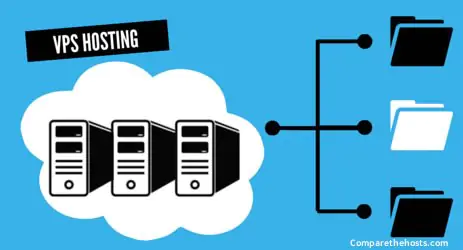
Source: computehost.com
VPS hosting is a bit pricier than shared, but you get more resources and the option to scale your website as your traffic grows.
In other words, you won’t be held back by slow speed if you’re generating more traffic and your online business is growing.
This hosting typically costs between $20 and 150 per month.
4. WordPress Hosting.
WordPress offers to host your site and domain on WordPress.com.
However, this is a stripped-down version of WordPress, without the ability to add specific plugins, themes, or more in-depth settings that you need to create a great website.
WordPress sites are typically faster than shared hosting because of their native integrations and expert support teams.

Source: bitcatcha.com
WordPress is also teaming up with other platforms like BigCommerce to bring deeper e-commerce functionality.
39% of e-commerce merchants reported they recently lost money due to performance or stability problems.
Combining the front-end functionality of WordPress with the backend power of an e-commerce platform is an excellent option for scaling growth.
WordPress hosting can cost anywhere from $5 to 100 per month.
5. Dedicated Server Hosting.
Dedicated server hosting is the process of leasing an entire server and managing all of your web hosting yourself.
If you have a significant website for a large organization, this higher-cost option gives you the most control over your hosting.
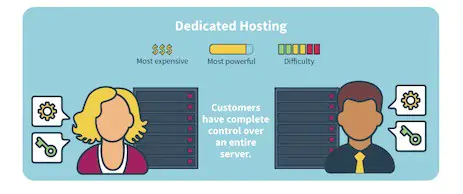
Source: milesweb.com
With complete control over your server, you can install highly complex programs, scripts, and applications that aren’t possible with shared hosting.
One drawback is that if you don’t have the technical knowledge to manage and run your server, you may run into issues.
You’ll either suffer website downtime or hire an expert to fix your problems.
Dedicated server hosting costs $120 per month or above.
6. Reseller Web Hosting.
Reseller programs allow developers or digital agencies to resell white-labeled hosting on their plans.
For example, if you have ten clients, you can buy a high-tier hosting package and resell hosting to your customers at a monthly fixed cost.
Companies like ResellerClub and WP Engine offer reseller plans, which typically include a management panel, billing software, and automated reports.
The price for reseller hosting is around $20-75, depending on features and bandwidth.
7. Colocation Web Hosting.
When you colocate, you rent space from data centers.
You need to provide your server hardware, and they provide security, cooling, power, and an Internet connection.
In addition to paying for rack space, you also pay for your bandwidth usage each month.
Because of the technical knowledge needed, the possibility of website downtime if something goes wrong, and high costs, colocation web hosting is not recommended for beginners or small businesses.
8. Ecommerce Hosting.
If you’re managing an online store, you can choose any e-commerce platform like BigCommerce and Shopify.
These separate self-hosted platforms will host your entire site for you.
Additionally, if you’re using WordPress, you could pay for an official hosting site like Hostinger and then add an e-commerce plugin like WooCommerce or BigCommerce for WordPress.
Ecommerce hosting is an option offered by hosts like WP Engine that allows your site to sell online.
Here’s what to look for when choosing an e-commerce host:
- Shopping cart software
- PCI compliant servers
- SSL and security to handle transactions
- Customer databases
- Low downtime, as you never want to lose out on revenue
- Fast server response times
Can You Start Hosting on AWS?
Amazon is known for being one of the largest e-commerce platforms in the world, but were you aware that it offers one of the best web services today?
Amazon Web Services is a secure cloud services platform that provides computing power and other functionalities to help businesses scale up.
Out of all these services, we will be more interested in their hosting services and whether you can start hosting WordPress on AWS.
You can host your site on AWS, which is known for its top-notch reliability and uptime.
Almost all of its data center locations have close to 100% uptime, and websites hosted there never go down.
It is fast becoming a popular cloud hosting option for businesses because giants such as Facebook host most of their business infrastructure on their cloud.
It is worth noting that setting up your site on AWS is not easy. You must learn complex codes to set up and manage the site.
However, they also have a managed option which reduces the technical work you need to do.
The security services provided by AWS are awe-inspiring, and your site will always be safe from attacks.
AWS charges for their hosting service on a pay-as-you-go basis. You will be billed based on your traffic, and spikes will increase your bill.
What is the Fastest Website Hosting?
Speed is an essential factor when picking your preferred hosting plan.
You might find an averagely fast hosting service that handles your regular traffic well, but what happens if you hit a favorite day and your traffic spikes?
Not all plans can take that well. This way, it helps to look at some factors when picking the fastest hosting.
Your audience is a vital determinant as they directly impact the speed.
Traffic spikes can make your site go down if the server capacity cannot handle the numbers.
This way, always pick a hosting plan to take your traffic even at peak levels.
The server location is another thing that affects speed.
Often overlooked, a CDN makes sure that the server you select is close to the audience’s general location.
Going for a cheaper option on the other side of the globe will affect your site’s speed.
Here are my picks for the fastest hosting services, but always conduct an in-depth analysis before picking one that will be fast for your site and audience:
faq
Web hosting is a service that provides shared or dedicated hosting, most commonly used to build websites.
The software also can store and host files, email addresses, and other content.
If you want to keep your site safe from malicious attacks and potential threats, my best secure web hosting picks are WP Engine, Hostinger, Bluehost, HostGator, and InMotion Hosting. These services offer great security and excellent customer support.
Web hosting is an account on a server that stores website files on the Internet, whereas a top-level domain (TLD) is a leased readable word (for example, Google.com) that sends users to an IP address.
The difference between a server and a host is that the server is a hardware device that stores and manages files in a network.
A host is a service provider that provides the technology needed for server files to be viewed on a computer.
No, WordPress is a CMS (Content Management System).
WordPress is one of the top content management systems in the world and allows users to create custom websites online.
However, you need a separate web host to use your custom domain name and run your website.
There are six leading web hosting types: shared, virtual private server, dedicated, cloud, managed, and colocation.
I explained each of them in this post, so go back and read more about them.
You can use a free host to create a website without one. However, you typically have to use a subdomain on their servers – i.e., “mywebsitename.wordpress.com.”
It is a better choice to choose a paid provider so that you can fully manage your domain and website.
SiteLock is a cloud-based security tool that works as a malware scanner.
There are a lot of other high-quality security plugins like Wordfence and BulletProof Security.
Ultimately, you don’t need the SiteLock Security up-sell, and you can find better and cheaper options.
If you want to avoid identity theft, domain privacy is worth it.
Without it, anyone can look up your WHOIS data and expose your sensitive information like your name and contact information like your address and phone number.
If you don’t want that information available to anyone online, you should select privacy protection when registering your site through a host.
Yes, with most hosting services, you are allowed to upgrade your plan at any time.
You can either do this in the dashboard yourself or contact support to help you.
I recommend you get your choice right from day one so that you don’t need to upgrade in the future.
Hosting your website requires you to use a Windows or Linux computer, put HMTL and CSS files into a folder, and then use a tool to post them online.
I don’t recommend you go this route as it has many security and performance issues.
A hostname is a word label used to identify a device connected to a computer network on the world wide web and form part of a DNS hosting system.
They are also separated from a host label by a “dot” or period. Hostnames are sent to Internet Protocol (IP) addresses, which are the numerical value of the device.
These two work together to serve up and manage all websites online.
“Localhost” is a term that refers to the local computer a program runs on.
A local computer has an IP address of 127.0.0.1 – a “loopback” address that routes information back to the local machine.
Google doesn’t directly provide hosting services, but it does offer options to maintaining a website presence.
You can use a third-party provider and link to a Google Domain. You can also use their web forwarding feature to redirect traffic to your existing website.
You can use WordPress’s .com site and run your website with a free subdomain.
However, the best option to own your site is to use a third-party web host at a low price of around $2.95/month.
Every website needs routine maintenance and software updates. Many web development companies offer this service to website owners.
Prices vary based on the size and complexity of the site but typically range from $30 on the low end to $1,000 on the high end for large, custom sites.
Bluehost backs up your site on its cheapest plan. With their Choice Plus option, you get CodeGuard included for free, a more customized, advanced backup tool.
You can also use many other backup plugins for websites like UpDraftPlus, VaultPress, and BackupBuddy.
Ultimately, CodeGuard is not worth increasing your monthly cost, and you can find better alternatives.
You need to invest in hosting and a name to run a website.
On the low end, hosting a website involves a fee for the domain that costs just $10 per year, and you could get a low-cost plan for $2.75 per month.
This total cost for the year would be $43. On the high end, if you pay for an expensive website name and high-end hosting package, your price could be in the thousands.
You should invest in your hosting service, as free options are limited and offer reduced services.
This could include interruptions in service unless you “pay as you go” for bandwidth and uptime. Knowing how to choose the best web hosting service is vital.
Shared hosting is not the most secure type, but it can be secure if you take the proper precautions.
Since you’re sharing server space with other websites, attacks on other sites can impact your own.
It’s essential to use security tools and plugins for your site. If you’re concerned about running into issues, choose dedicated hosting.
In Summary
When choosing a website hosting provider: focus on security, reliability, speed, and technical support.
I hope this guide gave you some context about which hosting companies fit your situation.
If you’re looking for the best web hosting platform, I recommend Nexcess, Bluehost, and WP Engine.
A host provides site speed, security, and ease of use, allowing you to focus on growing your business, not dealing with issues.
Give these recommendations a try, and happy hosting!
Discover Our Latest Articles
This Xero Review is for business owners who appreciates and recorgnises truth
I have tried many microtask platforms in the past and today, i
Miva Open University in Abuja is now accepting applications for the 2026/2027
Getting a University Degree in Nigeria is no longer difficult as long
Speaking of global hiring, remote work is now the order of the
Let's talk about Amplemarket Integrations for a bit. If your team uses
This is a detailed comparison of Amplemarket vs Apollo vs Lusha vs
Amplemarket has become a leader in AI-powered sales automation, and for good
Let talk about AI note taking, because in the world of healthcare,
As we discuss about the Carepatron pricing plans, it's also important to
Let's see Carepatron vs SimplePractice, which one is the best software for
In 2025, structured data is no longer optional, it’s essential; so let's
This is going to be a simple comparison of Alliai vs SEMrush
What are the Best-Selling Products on AliDrop in 2025? Choosing the right


